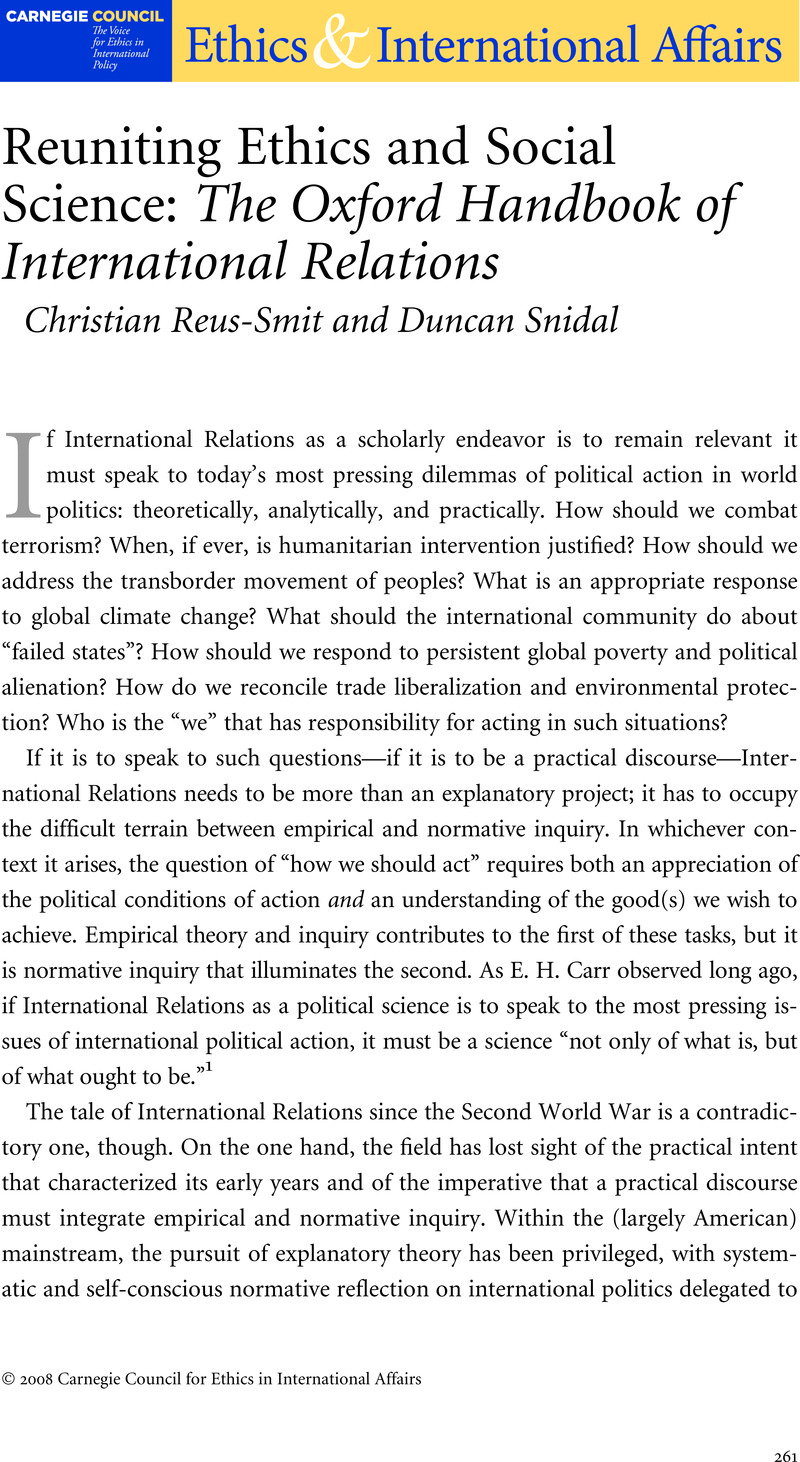Article contents
Reuniting Ethics and Social Science: The Oxford Handbook of International Relations
Published online by Cambridge University Press: 25 March 2011
Abstract

- Type
- Essays
- Information
- Copyright
- Copyright © Carnegie Council for Ethics in International Affairs 2008
References
Notes
1 E. H. Carr, The Twenty Years’ Crisis, 1919–1939(Basingstoke, UK: Palgrave Macmillan, 2001), p. 6.
2 Christian Reus-Smit and Duncan Snidal, “Between Utopia and Reality: The Practical Discourses of International Relations,” in Christian Reus-Smit and Duncan Snidal, eds., Oxford Handbook of International Relations(New York: Oxford University Press, 2008).
3 The Oxford Handbook of International Relations(hereafter OHIR) provides a comprehensive overview of the field. Its major sections address, respectively: different ways of imagining the discipline; the major theoretical perspectives; contending methodological approaches; the boundaries between International Relations and related fields, such as international law and strategic studies; the relationship between the scholar and the policy-maker; the issue of the field's diversity; and a selection of visions by eminent and new voices regarding how the field ought to be developing.
4 William Wohlforth, “Realism,” OHIR, ch. 7.
5 Jack Donnelly, “The Ethics of Realism,” OHIR, ch. 8.
6 Robert Ayson, “Strategic Studies,” OHIR, ch. 32.
7 David Lake, “The State and International Relations,” OHIR, ch. 2.
8 Joel Quirk, “Historical Methods,” OHIR, ch. 30.
9 Andrew H. Kydd, “Methodological Individualism and Rational Choice,” OHIR, ch. 25.
10 John Ravenhill, “International Political Economy,” OHIR, ch. 31.
11 Andrew Moravcsik, “The New Liberalism,” OHIR, ch. 13.
12 Michael Barnett and Kathryn Sikkink, “From International Relations to Global Society,” OHIR, ch. 3.
13 Tim Dunne, “The English School,” OHIR, ch. 15.
14 Michael Byers, “International Law,” OHIR, ch. 35.
15 Arthur A. Stein, “Neoliberal Institutionalism,” OHIR ch. 11.
16 James L. Richardson, “The Ethics of Neoliberal Institutionalism,” OHIR, ch. 12.
17 Peter J. Katzenstein and Rudra Sil, “Eclectic Theorizing in the Study and Practice of International Relations,” OHIR, ch. 6.
18 Andrew Bennett and Colin Elman, “Case Study Methods,” OHIR, ch. 29.
19 Richard Price, “The Ethics of Constructivism,” OHIR, ch. 18; see also Richard Price, ed., Moral Limit and Possibility in World Politics(Cambridge: Cambridge University Press, 2008).
20 Robyn Eckersley, “The Ethics of Critical Theory,” OHIR, ch. 20.
21 Allen Buchanan and Robert O. Keohane, “The Preventive Use of Force: A Cosmopolitan Institutional Proposal,” Ethics & International Affairs 18, no. 1 (2004), pp. 1–22; and Robyn Eckersley, The Green State: Rethinking Democracy and Sovereignty(Cambridge, Mass.: MIT Press, 2004).
22 Friedrich Kratochwil, “Sociological Approaches,” OHIR, ch. 26; and James Goldgeier and Philip Tetlock, “Psychological Approaches,” OHIR, ch. 27.
23 Henry R. Nau, “Scholarship and Policy-making: Who Speaks Truth to Whom?” OHIR, ch. 36; and Joseph S. Nye, Jr., “International Relations: The Relevance of Theory to Practice,” OHIR, ch. 37.
- 5
- Cited by




